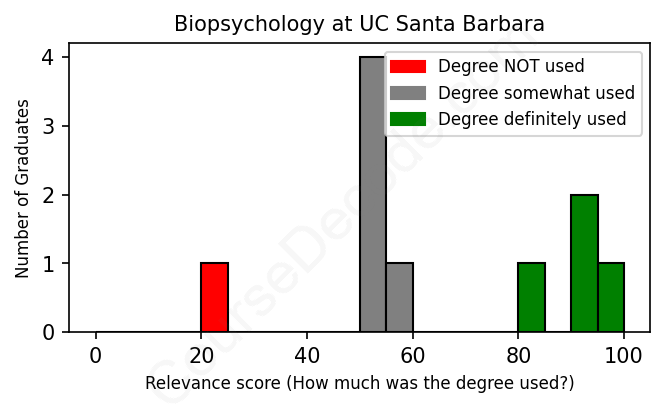
First, some facts. Of the Biopsychology graduates from UC Santa Barbara we've analyzed , here's how many have used (or NOT used) their degree in their career:

These are estimates based on AI analysis of 10 LinkedIn profiles (see below).
The verdict? Slightly below average. Overall, with an average relevance score of 64%, Biopsychology graduates from UC Santa Barbara have a slightly lower likelihood (-3%) of finding work in this field compared to the average graduate across all fields:
And for comparison, here's the chart for all profiles we've looked at across all degrees.
Also, after graduating, 40% of these graduates have pursued further education other than another Bachelor's degree (such as a Masters degree or other), compared to the average across all profiles of 35%. This suggests you may need more than just a Bachelors degree to be competitive as a Biopsychology graduate.
See the details:
|
Relevance score: 91% We think this person has gone into a career highly relevant to their degree. We think this person has gone into a career highly relevant to their degree.
DEGREE INFOGraduated in 2022 from UC Santa Barbara with a Bachelor of Science - BS in Biopsychology. No other secondary education since. JOB HISTORY SINCE GRADUATIONSummer Intern Hongene Biotech Corporation USA Jun 2022 - Aug 2022 Research Assistant  Cognition in Context Lab Oct 2022 - Present ABOUTNo information provided. |
The top 10 most common jobs done by the graduates we've analyzed (ranked most common to least) are:
When looking at the career paths of people who studied Biopsychology at UC Santa Barbara, it's pretty clear that a lot of them have gravitated towards roles in education, healthcare, and some positions related to research or legal work. Many individuals have taken on jobs like teachers, medical assistants, and researchers, but the relevance of these roles to their Biopsychology degree varies. For instance, while teaching can involve some principles of psychology, it's not always directly tied to the nuances of biopsychology. A majority of jobs appear to utilize a very broad understanding of psychology rather than the specialized knowledge inherent in a Biopsychology degree.
On the other hand, there are some standout positions where the degree's relevance shines through. For example, roles like Research Assistant in psychology labs or internships that involve studying health behaviors align closely with their academic background. Yet, a lot of jobs like teaching or working in medical settings tend to focus more on general patient care or educational objectives rather than deep biopsychological principles. So overall, while many of these careers reflect a valuable skill set developed through their education, only a handful directly apply the specialized knowledge that comes from a Biopsychology program.
Here is a visual representation of the most common words in job titles for Biopsychology graduates (this is across all Biopsychology graduates we've analyzed, not just those who went to UC Santa Barbara):

Looking at the career paths of Biopsychology grads from UC Santa Barbara, it seems like a mixed bag, especially within the first few years after graduation. Right after finishing their degree, many of them land jobs in education and healthcare, such as teaching or working as a medical assistant. For instance, those who graduated between 2015 and 2019 often started in positions like special education teachers or medical assistants, which makes sense given the focus on psychology and biological sciences in their studies. These roles can be seen as a way to utilize their knowledge of human behavior and health, even if they don't directly call themselves "biopsychologists" yet.
Fast forward a few years, and things appear to diversify a bit. While several graduates stick with healthcare and education, others start branching out into more specialized roles related to their studies, like research assistantships in psychology labs or medical communications in pharma companies. By the five or ten-year mark, some folks are stepping up to postdoctoral fellowships or senior specialist roles in medical communications, which is quite impressive and shows that those connections between biopsychology and health are utilized well in careers. However, there are still some graduates who haven’t found jobs relevant to their specific degrees, indicating that some may have taken a more winding path. Overall, while many are doing well in their careers, it’s clear there are varying degrees of relevance to their Biopsychology degree!
Honestly, a Bachelor’s degree in Biopsychology can be pretty challenging, but it really depends on your interest in the subjects and how well you manage your time. At UC Santa Barbara, you'll be diving into a mix of biology, psychology, and neuroscience, which means you’ll have to grapple with both scientific concepts and human behavior. If you’re into science and enjoy understanding how the brain works, you'll probably find it fascinating. However, be prepared for some tough coursework and labs, plus the occasional late-night studying for exams. It might feel harder than some other degrees because of the rigorous requirements, but if you stay organized and passionate about the material, you can definitely handle it!
Most commonly, in the LinkedIn profiles we've looked at, it takes people 4 years to finish a Bachelor degree in Biopsychology.
Looking at these graduates from UC Santa Barbara, it seems like they're generally working in fields that might not be the highest-paying right away, especially with roles like teachers or medical assistants, which often start on the lower end of the pay scale. The ones venturing into the legal and medical areas could be on a better financial path, given their internships and clerkship positions that typically lead to more lucrative jobs down the line. However, many recent grads are still in entry-level roles or internships, meaning they might not be rolling in dough just yet. Overall, while some may be doing decent financially, it wouldn't be surprising if others are still figuring out their financial footing as they gain experience.
Here is a visual representation of the most common words seen in the "about" section of LinkedIn profiles who have a Bachelor degree in Biopsychology (this is across all Biopsychology graduates we've analyzed, not just those who went to UC Santa Barbara). This may or may not be useful:

Here are all colleges offering a Bachelor degree in Biopsychology (ordered by the average relevance score of their Biopsychology graduates, best to worst) where we have analyzed at least 10 of their graduates:
| College | Score | Count |
|---|---|---|
 University of Michigan University of Michigan
|
73 | 10 |
 Tufts University Tufts University
|
67 | 11 |
 UC Santa Barbara UC Santa Barbara
|
64 | 10 |
 University of California, Santa Barbara University of California, Santa Barbara
|
61 | 15 |